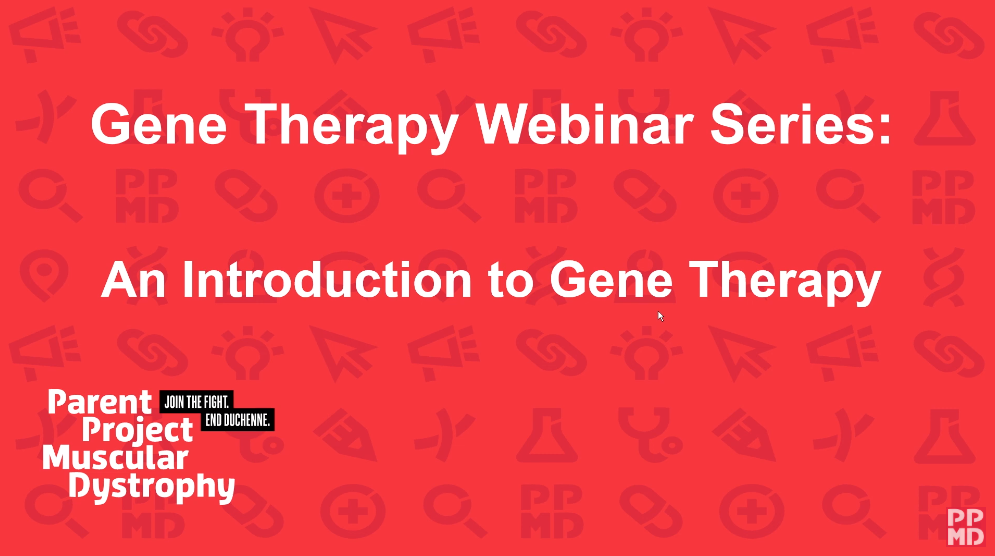
For PPMD a pivotal aspect of care is education. Without the proper knowledge of what the potential benefits and risks are of an investigational product a family cannot make well informed decisions. As the landscape of gene therapy continues to grow and evolve, we want to ensure that every person who is eligible to receive gene therapy feels they are making an informed decision about a treatment that has the potential to impact them for many years. With that in mind, PPMD will be releasing a series of gene therapy webinars – as part of our ongoing Gene Therapy Initiative – to further educate our community.
It is our hope that these webinars can help supplement the learnings we have previously shared with the community and continue to build everyone’s base of knowledge. We also recognize that some of the concepts presented can be difficult to grasp, so we will compile other resources where families can learn about gene therapy. Sometimes hearing information presented in different ways can help an individual finally understand a particular topic and we want to ensure everyone feels empowered to make decisions.
Watch: Introduction to Gene Therapy
What is a gene?
A gene is a sequence of DNA that codes for a protein. When a gene is expressed (turned on) it produces a protein.
What happens when a gene is mutated or changed?
A mutation, or a change, in a gene can result in the protein being produced being altered so that the protein becomes non-functional or isn’t produced.
What is gene therapy?
Gene therapy is a way to treat a disease by changing gene expression. That can be accomplished by correcting the mutation in the gene, providing a replacement copy of the mutated gene, introducing a surrogate gene that produces a protein that can perform a similar role to the non-functional protein, or supplying genes that treat other symptoms of the disease.
What is being delivered in gene therapy?
There are three main components to gene therapy.
- Transgene – The genetic material being delivered to modify, replace, or restore gene expression to begin producing protein.
- Promoter – A sequence of DNA that controls where in the body the transgene is expressed or turned on.
- Vector – Modified virus, cells, or nanoparticles that shuttle the transgene and promoter DNA sequences into the cells of the body.
What vectors are being used currently in Duchenne gene therapy trials?
Currently the gene therapy trials that are ongoing or preparing to launch are utilizing Adeno-associated virus (AAV). This virus is not known to cause disease in humans and is effective for delivering genetic material to muscle cells.
What are pre-existing antibodies?
Antibodies, a type of protein, are one of your immune systems tools for defending your body from , which are infectious agents like viruses or bacteria. Once exposed to a pathogen your immune system can produce antibodies that can help recognize and prevent that pathogen from infecting your cells if you are re-exposed. In the context of gene therapy, pre-existing antibodies are antibodies an individual has to a particular vector, like AAV, that they have acquired at some early point in their life. Although AAV doesn’t cause disease in humans it does exist in nature, therefore individuals may already have been exposed to AVV and developed antibodies to AAV.
What does having pre-existing antibodies to a particular virus mean for me?
If an individual screens positive for pre-existing antibodies to the viral vector being used in a clinical trial, they will not be able to receive that particular gene therapy.
How can I be tested for pre-existing antibodies?
Testing for pre-existing antibodies is performed through a blood test. An individual’s blood is screened for the presence and amount of antibodies to a particular viral vector.
Can I be tested by my doctor or a laboratory offering anti-body screening?
Having private testing performed will not grant you access into any ongoing clinical trial. Each trial sponsor has their own testing methodologies to verify the presence and amount of pre-existing antibodies to their viral vector.
If I screen fail for one gene therapy trial due to having pre-existing antibodies does that disqualify me from all gene therapy trials?
No. In order to be excluded from another trial you would need to go through that sponsors screening process. Not all trials are using the same version of AAV, which may present an opportunity for inclusion in a different trial.
If I receive gene therapy, will I be able to receive it again at a later time?
Currently, no. Once an individual receives gene therapy their immune system will develop antibodies to the viral vector used to deliver the gene therapy.
If I receive gene therapy, will I be able to participate in another clinical trial?
Currently, no. Because of the longevity and potentially transformative nature of gene therapy, other clinical trials exclude patients that have received gene therapy.
Where can I learn more about gene therapy?
PPMD’s gene therapy initiative page may help clarify additional questions about gene therapy:
Other helpful descriptions of gene therapy with examples of their implementation in other diseases have been prepared by the FDA and the American Society of Gene and Cell Therapy



 by: Parent Project Muscular Dystrophy
by: Parent Project Muscular Dystrophy

